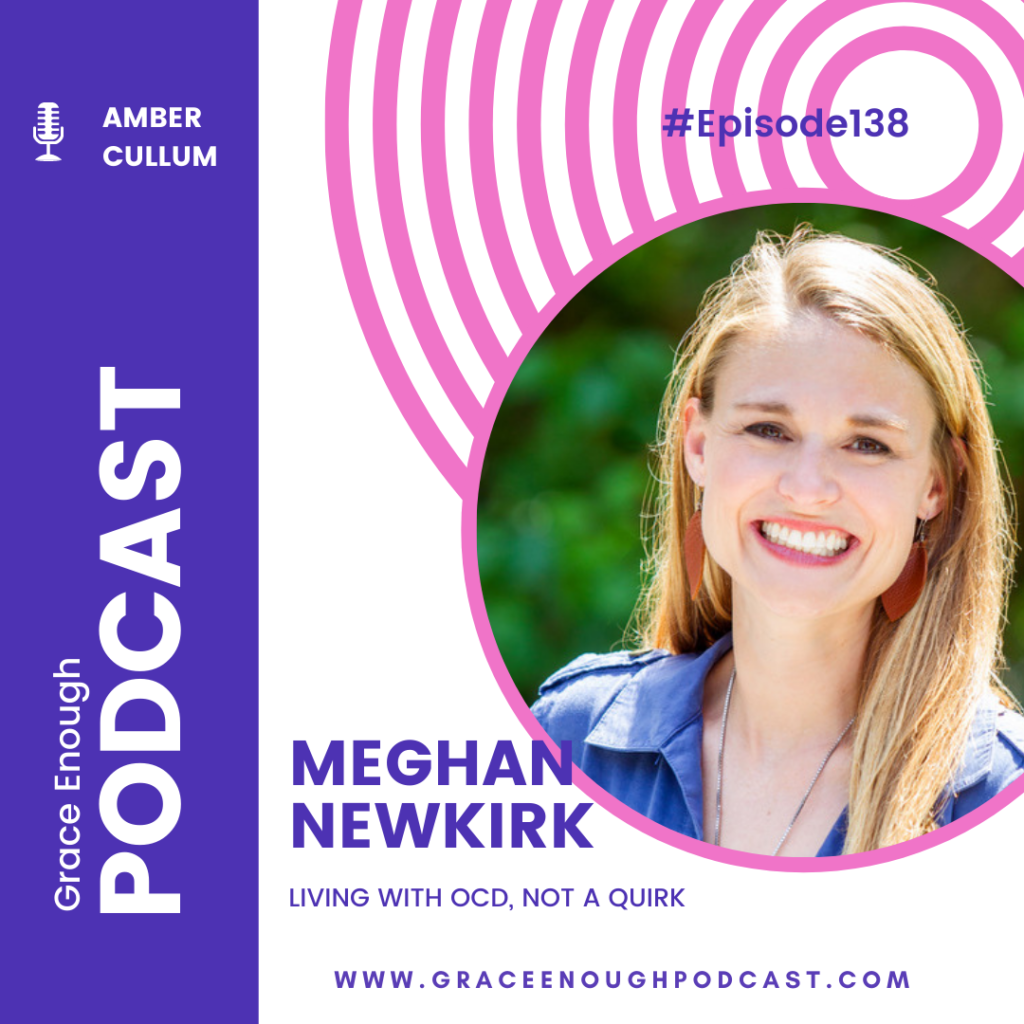
Meghan Newkirk is a Raleigh, North Carolina native who graduated from North Carolina. She was diagnosed with Obsessive Compulsive Disorder while in college and has learned how to combat it with counseling and medication.
Along with writing Meghan loves being a wife to her husband Scott and mother to three amazing kids, who keep her on her toes.
Meghan Newkirk joins Amber to discuss living with and treating OCD as a follower of Jesus, a wife, and a mom.
“In middle school, I started becoming very fearful of germs, very fearful of certain intrusive thoughts, as they’re called, where you might think about something in a way that’s disruptive. Sometimes they have to do with whether you would hurt someone or feelings you might have that feel very abnormal.”
“[With OCD] the wires get crossed and thoughts that normally would just pass through get stuck.”
“For instance, I would walk through the halls and I would feel myself becoming, “contaminated” by the dirtiness and the messiness and the filth of the school and would become obsessed with that feeling of wanting to feel clean.”
“I was also obsessing about harming others, fearful of what I could potentially do to someone else. This idea that your thoughts have power. If you think something, it can affect a circumstance.”
“It’s very individual and specific for each person, there are a lot of what they call sub themes to OCD. They’re all in the same kind of vein and that it attacks what you value the most.”
“There’s a big difference between, I feel so good when this is ordered, versus I am tortured by my own brain, and my brain doesn’t ever shut off.”
“What happens with people like myself who have this type of a diagnosis… [is we] take Scripture and misapply it…It’s not so much the fault of the church, but the desire of the heart of the sufferer.”
“I would say, ‘Well, my faith is not enough, or I’m so worried about this’ and she’d [mom] say, ‘Look, God works through our weaknesses’.”
“Tt’s so important for us to remember that God is not a labeler.”
“The only thing we need to label ourselves with is that we’re a child of God, period. That can be a really hard thing to settle on when you have OCD.”
“It is without a doubt an opportunity for you to grow in your faith, but you need to have someone who can look at you and say, ‘We’re going to make a list of your top fears and we’re going to work through them.’… You have to have somebody that’s going to be able to work through the practical sides of doing that.”
“There are a million different ways that OCD can present itself in a person. The cycles are the same, the obsessing, and then the compulsing to relieve the anxiety, regardless of the [presentation].”
“I would hope that someone would come to me and say, God can use even OCD, because people who have OCD feel shame, they feel embarrassed.”
“The second goal would be for people who love someone with OCD, to not feel guilt and shame over being exhausted with them.”
“My favorite phrase my counselor taught me is, I have to walk away uncomfortable.”
“I never get too comfortable, because OCD is like whack a mole. You never know which one’s going to pop up.”
“The reason why reassurance doesn’t work is because it’s temporary. It’s almost like an addiction. When someone reassures you, it tells the brain that this is an important problem that needs to get solved. It reinforces the going back to it and trains the brain to think, this is an emergency.”
“When you’re dealing with OCD, you are going to have your eyes squinted in discomfort, you’re going to be cringing, you’re going to be putting yourself in really uncomfortable situations that are going to feel terrible, but that’s when you know that the treatment is working.”
Take 15% off with the code: Grace15 through July and August 2021.
Shop Green Roof Gallery today.



© Grace Enough Podcast2024